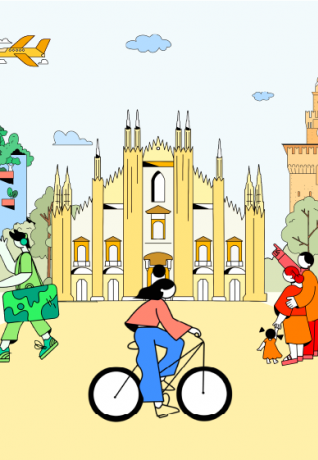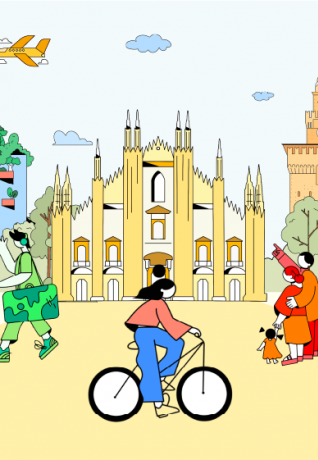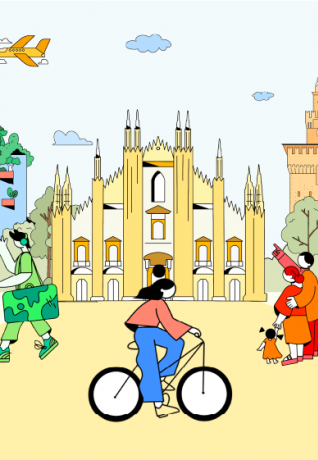Are you considering Milano as your new home where to live and work? We give you our heartfelt welcome to a city that has a global flair but stays very much Italian in terms of enjoying the good life: Milano is a great city to pursue your career while striking the right work-life balance.
Milano is a compact and flat city (it’s basically a circle having a 15-km/9-mile radius) that is easy to traverse by bike, moped, scooter, thanks to advanced mobility sharing services, and especially its efficient public transport system run by ATM based on trams, electric and hybrid buses, and 5 subway metro lines, including the brand-new one, M4, linking the Linate Airport (LIN) to San Babila, the heart of shopping in central Milano, in 12 minutes.
It’s a city composed of diverse and distinctive neighborhoods, which surround the historic city center each expressing their social identities and functions. For example, to the southwest of Duomo, Ticinese with its Colonne di San Lorenzo (Roman columns by a basilica) and the Navigli canals designed by Leonardo, offer much-appreciated hangouts to Milanese. At the city’s east, Porta Venezia is the home of LGBTQ bars and cuisine from the Horn of Africa. In the city’s north, Isola tends to be liked by people that are into alternative crafts and indie culture, while Porta Romana, in the city’s south, is appreciated by foodies and students. Then there’s Chinatown, and artsy NoLo and that’s just the beginning of it.
Milano sits at the intersection of the North-South and East-West EU transport corridors, and its three international airports - Malpensa (MXP), Linate (LIN) and Orio al Serio (BGY) - ferry millions of business travelers and leisure tourists each year, while its three major train stations – Centrale, Garibaldi, Cadorna - secure high-speed connections to major European capitals and Italian cities.
Rome is three hours away on high-speed trains, Bologna and Turin are one hour away, Florence two, as is Venice. The Lakes, the Alps, and the Riviera all are less than two hours away by car.
Milano is a factory of knowledge and innovation. In fact, Milano is the home of 11 internationally-ranked universities, 200,000 undergraduate and graduate students, 347,000 employees working in the Life Sciences, and 130,000 skilled medical personnel working in health care. It represents around 30% of the whole national biotech industry. The Lombard capital has become a European hub of innovation.
Impressively, the major projects of urban transformation in the metropolitan area all develop from scientific and cultural institutions.
There are currently 1,300 research and technology transfer centers and nearly 2,800 startups based in Milano, which are being accelerated by 86 active venture capital funds.
Milano is generally safe and welcoming and the Milanese are generally conscientious and opinionated citizens who are ready to help and tend to look at life with good humor and a sense of irony.
Milano is fast thinking and fast-walking: the residents are prone to acting rather than talking, and eschew lofty rhetoric in favor of creative pragmatism.
The Milanese are into sports, because nearly everybody is an ardent fan of either FC Inter or AC Milan football teams, although the Milanese also love volley and basketball, and practice every sport conceivable with joy and dedication: from running to cycling and swimming in the municipal pools, and there are also great facilities for track&field sports, baseball, hockey, football, riding and fencing.
Milano is a cosmopolitan city where English is often spoken.
Internet delivery of groceries and meals is well developed, and the liking for e-commerce is widespread. Markets (mercati comunali) are a great option for fresh produce, fruit and vegetables, next to supermarkets, some of which are open into the night.
In Milano there is universal municipal kindergarten education, but getting your baby toddler into a crèche or a nursery could be a bit more difficult.
The quality of public primary education is particularly high and the city’s high schools (licei and istituti tecnici) regularly top the national rankings.
The city is also proud to offer French and German secondary education and there is an American high school nearby. And the British Council, Instituto Cervantes, Goethe Institut, Swiss House and other international cultural institutions are part and parcel of the city’s social and cultural life.
Many are the neighborhood parks that have been opened over the last decade and they all have pet areas and also many restaurants and shops in Milano welcome pets inside, reflecting the city's pet-friendly culture. Milanese people love spending time with their furry friends, whether at home or out and about.

 Log in
Log in



